Research Essay: Love, Sex & Sexuality in Islam - Western Impact
VerifiedAdded on 2023/04/08
|8
|2440
|65
Essay
AI Summary
This research essay delves into the concepts of love and sexuality within Islam, examining how historical patterns and religious norms have evolved, particularly under the influence of Western culture. It addresses the core beliefs of Islam regarding love, intimacy, and sexual relations, highlighting the traditional emphasis on marriage as the only permissible context for such expressions. The essay further explores the impact of globalization and Western values on the perceptions of Muslim youth, noting the emergence of practices like 'halal dating' and changing attitudes towards arranged marriages and polygamy. It also acknowledges differing views on the extent of Western influence, with some studies suggesting minimal impact on core Islamic sexual ethics, while others highlight a significant shift in attitudes, especially among younger generations. The essay concludes that while traditional Islamic views emphasize marriage as the foundation for love and sex, Western influences are undeniably shaping contemporary perspectives within the Muslim community.
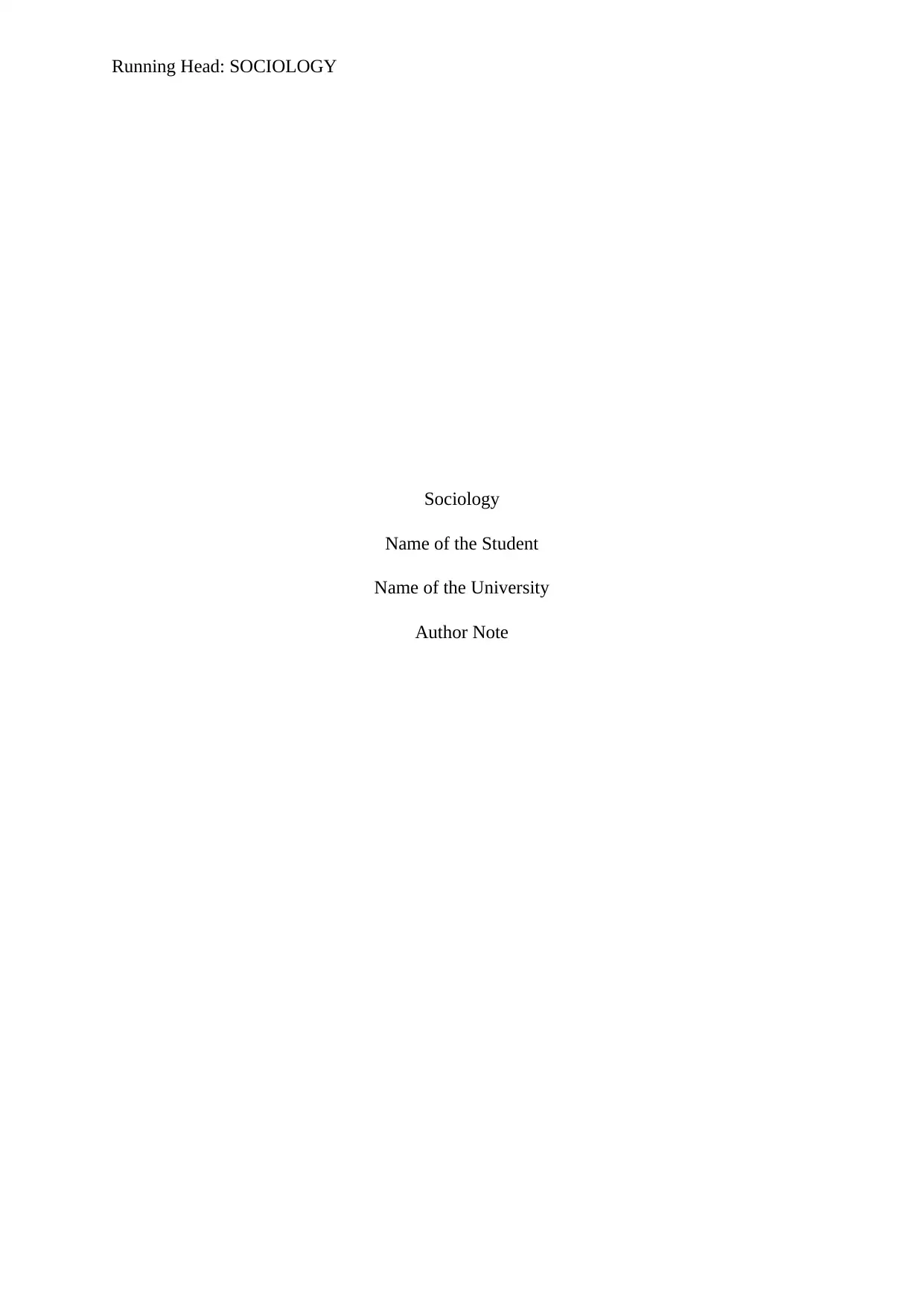
Running Head: SOCIOLOGY
Sociology
Name of the Student
Name of the University
Author Note
Sociology
Name of the Student
Name of the University
Author Note
Paraphrase This Document
Need a fresh take? Get an instant paraphrase of this document with our AI Paraphraser
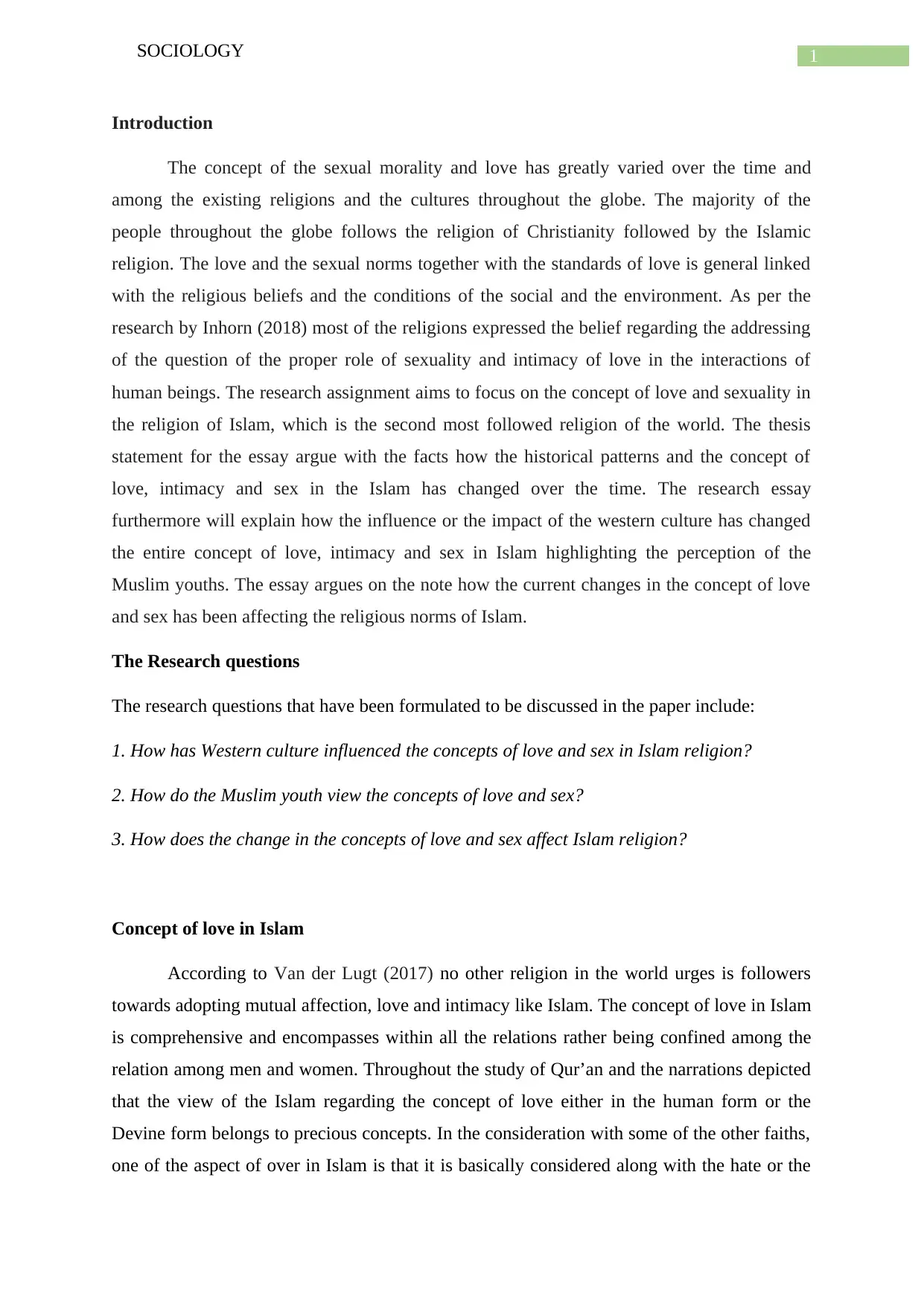
1SOCIOLOGY
Introduction
The concept of the sexual morality and love has greatly varied over the time and
among the existing religions and the cultures throughout the globe. The majority of the
people throughout the globe follows the religion of Christianity followed by the Islamic
religion. The love and the sexual norms together with the standards of love is general linked
with the religious beliefs and the conditions of the social and the environment. As per the
research by Inhorn (2018) most of the religions expressed the belief regarding the addressing
of the question of the proper role of sexuality and intimacy of love in the interactions of
human beings. The research assignment aims to focus on the concept of love and sexuality in
the religion of Islam, which is the second most followed religion of the world. The thesis
statement for the essay argue with the facts how the historical patterns and the concept of
love, intimacy and sex in the Islam has changed over the time. The research essay
furthermore will explain how the influence or the impact of the western culture has changed
the entire concept of love, intimacy and sex in Islam highlighting the perception of the
Muslim youths. The essay argues on the note how the current changes in the concept of love
and sex has been affecting the religious norms of Islam.
The Research questions
The research questions that have been formulated to be discussed in the paper include:
1. How has Western culture influenced the concepts of love and sex in Islam religion?
2. How do the Muslim youth view the concepts of love and sex?
3. How does the change in the concepts of love and sex affect Islam religion?
Concept of love in Islam
According to Van der Lugt (2017) no other religion in the world urges is followers
towards adopting mutual affection, love and intimacy like Islam. The concept of love in Islam
is comprehensive and encompasses within all the relations rather being confined among the
relation among men and women. Throughout the study of Qur’an and the narrations depicted
that the view of the Islam regarding the concept of love either in the human form or the
Devine form belongs to precious concepts. In the consideration with some of the other faiths,
one of the aspect of over in Islam is that it is basically considered along with the hate or the
Introduction
The concept of the sexual morality and love has greatly varied over the time and
among the existing religions and the cultures throughout the globe. The majority of the
people throughout the globe follows the religion of Christianity followed by the Islamic
religion. The love and the sexual norms together with the standards of love is general linked
with the religious beliefs and the conditions of the social and the environment. As per the
research by Inhorn (2018) most of the religions expressed the belief regarding the addressing
of the question of the proper role of sexuality and intimacy of love in the interactions of
human beings. The research assignment aims to focus on the concept of love and sexuality in
the religion of Islam, which is the second most followed religion of the world. The thesis
statement for the essay argue with the facts how the historical patterns and the concept of
love, intimacy and sex in the Islam has changed over the time. The research essay
furthermore will explain how the influence or the impact of the western culture has changed
the entire concept of love, intimacy and sex in Islam highlighting the perception of the
Muslim youths. The essay argues on the note how the current changes in the concept of love
and sex has been affecting the religious norms of Islam.
The Research questions
The research questions that have been formulated to be discussed in the paper include:
1. How has Western culture influenced the concepts of love and sex in Islam religion?
2. How do the Muslim youth view the concepts of love and sex?
3. How does the change in the concepts of love and sex affect Islam religion?
Concept of love in Islam
According to Van der Lugt (2017) no other religion in the world urges is followers
towards adopting mutual affection, love and intimacy like Islam. The concept of love in Islam
is comprehensive and encompasses within all the relations rather being confined among the
relation among men and women. Throughout the study of Qur’an and the narrations depicted
that the view of the Islam regarding the concept of love either in the human form or the
Devine form belongs to precious concepts. In the consideration with some of the other faiths,
one of the aspect of over in Islam is that it is basically considered along with the hate or the
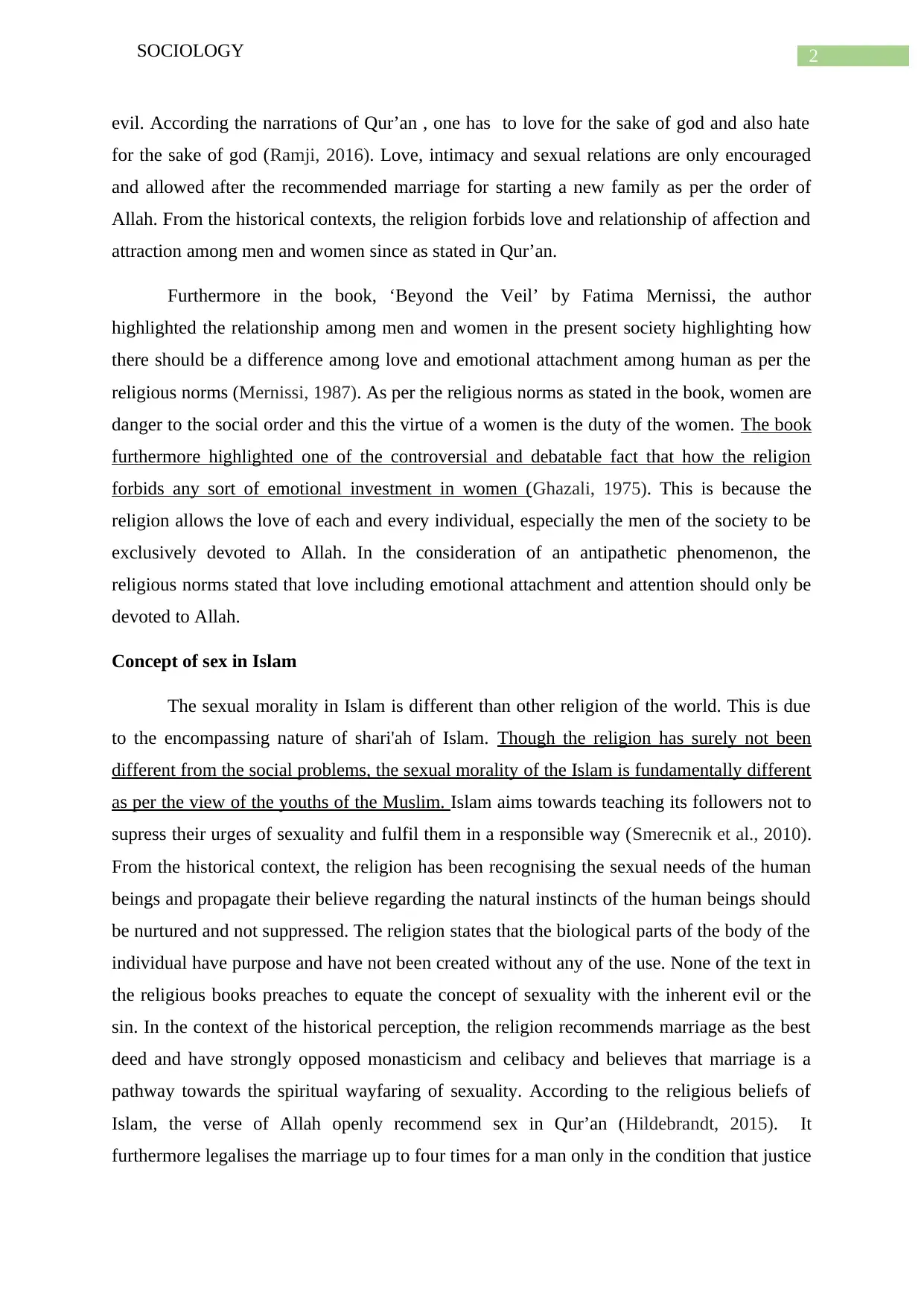
2SOCIOLOGY
evil. According the narrations of Qur’an , one has to love for the sake of god and also hate
for the sake of god (Ramji, 2016). Love, intimacy and sexual relations are only encouraged
and allowed after the recommended marriage for starting a new family as per the order of
Allah. From the historical contexts, the religion forbids love and relationship of affection and
attraction among men and women since as stated in Qur’an.
Furthermore in the book, ‘Beyond the Veil’ by Fatima Mernissi, the author
highlighted the relationship among men and women in the present society highlighting how
there should be a difference among love and emotional attachment among human as per the
religious norms (Mernissi, 1987). As per the religious norms as stated in the book, women are
danger to the social order and this the virtue of a women is the duty of the women. The book
furthermore highlighted one of the controversial and debatable fact that how the religion
forbids any sort of emotional investment in women (Ghazali, 1975). This is because the
religion allows the love of each and every individual, especially the men of the society to be
exclusively devoted to Allah. In the consideration of an antipathetic phenomenon, the
religious norms stated that love including emotional attachment and attention should only be
devoted to Allah.
Concept of sex in Islam
The sexual morality in Islam is different than other religion of the world. This is due
to the encompassing nature of shari'ah of Islam. Though the religion has surely not been
different from the social problems, the sexual morality of the Islam is fundamentally different
as per the view of the youths of the Muslim. Islam aims towards teaching its followers not to
supress their urges of sexuality and fulfil them in a responsible way (Smerecnik et al., 2010).
From the historical context, the religion has been recognising the sexual needs of the human
beings and propagate their believe regarding the natural instincts of the human beings should
be nurtured and not suppressed. The religion states that the biological parts of the body of the
individual have purpose and have not been created without any of the use. None of the text in
the religious books preaches to equate the concept of sexuality with the inherent evil or the
sin. In the context of the historical perception, the religion recommends marriage as the best
deed and have strongly opposed monasticism and celibacy and believes that marriage is a
pathway towards the spiritual wayfaring of sexuality. According to the religious beliefs of
Islam, the verse of Allah openly recommend sex in Qur’an (Hildebrandt, 2015). It
furthermore legalises the marriage up to four times for a man only in the condition that justice
evil. According the narrations of Qur’an , one has to love for the sake of god and also hate
for the sake of god (Ramji, 2016). Love, intimacy and sexual relations are only encouraged
and allowed after the recommended marriage for starting a new family as per the order of
Allah. From the historical contexts, the religion forbids love and relationship of affection and
attraction among men and women since as stated in Qur’an.
Furthermore in the book, ‘Beyond the Veil’ by Fatima Mernissi, the author
highlighted the relationship among men and women in the present society highlighting how
there should be a difference among love and emotional attachment among human as per the
religious norms (Mernissi, 1987). As per the religious norms as stated in the book, women are
danger to the social order and this the virtue of a women is the duty of the women. The book
furthermore highlighted one of the controversial and debatable fact that how the religion
forbids any sort of emotional investment in women (Ghazali, 1975). This is because the
religion allows the love of each and every individual, especially the men of the society to be
exclusively devoted to Allah. In the consideration of an antipathetic phenomenon, the
religious norms stated that love including emotional attachment and attention should only be
devoted to Allah.
Concept of sex in Islam
The sexual morality in Islam is different than other religion of the world. This is due
to the encompassing nature of shari'ah of Islam. Though the religion has surely not been
different from the social problems, the sexual morality of the Islam is fundamentally different
as per the view of the youths of the Muslim. Islam aims towards teaching its followers not to
supress their urges of sexuality and fulfil them in a responsible way (Smerecnik et al., 2010).
From the historical context, the religion has been recognising the sexual needs of the human
beings and propagate their believe regarding the natural instincts of the human beings should
be nurtured and not suppressed. The religion states that the biological parts of the body of the
individual have purpose and have not been created without any of the use. None of the text in
the religious books preaches to equate the concept of sexuality with the inherent evil or the
sin. In the context of the historical perception, the religion recommends marriage as the best
deed and have strongly opposed monasticism and celibacy and believes that marriage is a
pathway towards the spiritual wayfaring of sexuality. According to the religious beliefs of
Islam, the verse of Allah openly recommend sex in Qur’an (Hildebrandt, 2015). It
furthermore legalises the marriage up to four times for a man only in the condition that justice
⊘ This is a preview!⊘
Do you want full access?
Subscribe today to unlock all pages.

Trusted by 1+ million students worldwide
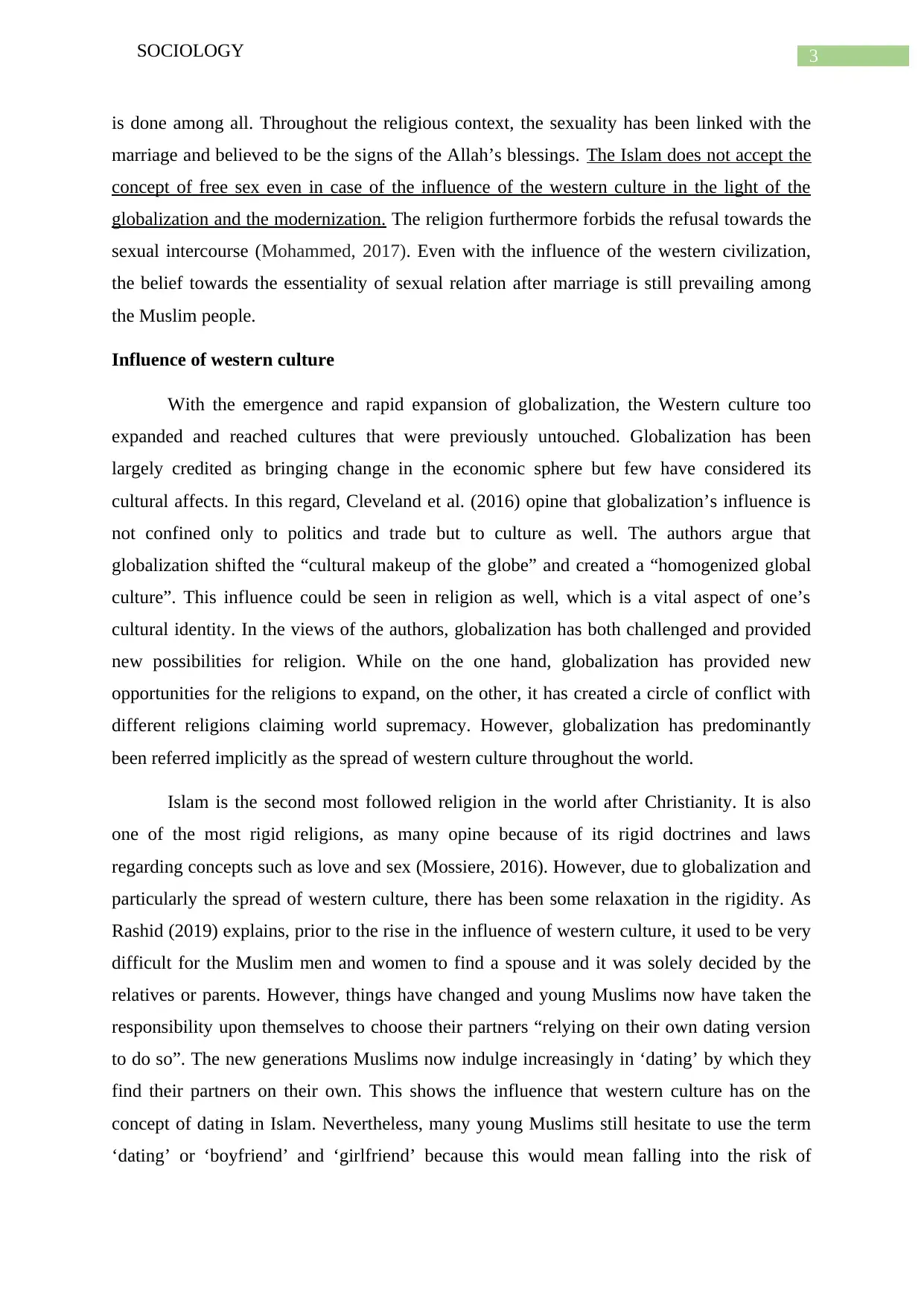
3SOCIOLOGY
is done among all. Throughout the religious context, the sexuality has been linked with the
marriage and believed to be the signs of the Allah’s blessings. The Islam does not accept the
concept of free sex even in case of the influence of the western culture in the light of the
globalization and the modernization. The religion furthermore forbids the refusal towards the
sexual intercourse (Mohammed, 2017). Even with the influence of the western civilization,
the belief towards the essentiality of sexual relation after marriage is still prevailing among
the Muslim people.
Influence of western culture
With the emergence and rapid expansion of globalization, the Western culture too
expanded and reached cultures that were previously untouched. Globalization has been
largely credited as bringing change in the economic sphere but few have considered its
cultural affects. In this regard, Cleveland et al. (2016) opine that globalization’s influence is
not confined only to politics and trade but to culture as well. The authors argue that
globalization shifted the “cultural makeup of the globe” and created a “homogenized global
culture”. This influence could be seen in religion as well, which is a vital aspect of one’s
cultural identity. In the views of the authors, globalization has both challenged and provided
new possibilities for religion. While on the one hand, globalization has provided new
opportunities for the religions to expand, on the other, it has created a circle of conflict with
different religions claiming world supremacy. However, globalization has predominantly
been referred implicitly as the spread of western culture throughout the world.
Islam is the second most followed religion in the world after Christianity. It is also
one of the most rigid religions, as many opine because of its rigid doctrines and laws
regarding concepts such as love and sex (Mossiere, 2016). However, due to globalization and
particularly the spread of western culture, there has been some relaxation in the rigidity. As
Rashid (2019) explains, prior to the rise in the influence of western culture, it used to be very
difficult for the Muslim men and women to find a spouse and it was solely decided by the
relatives or parents. However, things have changed and young Muslims now have taken the
responsibility upon themselves to choose their partners “relying on their own dating version
to do so”. The new generations Muslims now indulge increasingly in ‘dating’ by which they
find their partners on their own. This shows the influence that western culture has on the
concept of dating in Islam. Nevertheless, many young Muslims still hesitate to use the term
‘dating’ or ‘boyfriend’ and ‘girlfriend’ because this would mean falling into the risk of
is done among all. Throughout the religious context, the sexuality has been linked with the
marriage and believed to be the signs of the Allah’s blessings. The Islam does not accept the
concept of free sex even in case of the influence of the western culture in the light of the
globalization and the modernization. The religion furthermore forbids the refusal towards the
sexual intercourse (Mohammed, 2017). Even with the influence of the western civilization,
the belief towards the essentiality of sexual relation after marriage is still prevailing among
the Muslim people.
Influence of western culture
With the emergence and rapid expansion of globalization, the Western culture too
expanded and reached cultures that were previously untouched. Globalization has been
largely credited as bringing change in the economic sphere but few have considered its
cultural affects. In this regard, Cleveland et al. (2016) opine that globalization’s influence is
not confined only to politics and trade but to culture as well. The authors argue that
globalization shifted the “cultural makeup of the globe” and created a “homogenized global
culture”. This influence could be seen in religion as well, which is a vital aspect of one’s
cultural identity. In the views of the authors, globalization has both challenged and provided
new possibilities for religion. While on the one hand, globalization has provided new
opportunities for the religions to expand, on the other, it has created a circle of conflict with
different religions claiming world supremacy. However, globalization has predominantly
been referred implicitly as the spread of western culture throughout the world.
Islam is the second most followed religion in the world after Christianity. It is also
one of the most rigid religions, as many opine because of its rigid doctrines and laws
regarding concepts such as love and sex (Mossiere, 2016). However, due to globalization and
particularly the spread of western culture, there has been some relaxation in the rigidity. As
Rashid (2019) explains, prior to the rise in the influence of western culture, it used to be very
difficult for the Muslim men and women to find a spouse and it was solely decided by the
relatives or parents. However, things have changed and young Muslims now have taken the
responsibility upon themselves to choose their partners “relying on their own dating version
to do so”. The new generations Muslims now indulge increasingly in ‘dating’ by which they
find their partners on their own. This shows the influence that western culture has on the
concept of dating in Islam. Nevertheless, many young Muslims still hesitate to use the term
‘dating’ or ‘boyfriend’ and ‘girlfriend’ because this would mean falling into the risk of
Paraphrase This Document
Need a fresh take? Get an instant paraphrase of this document with our AI Paraphraser
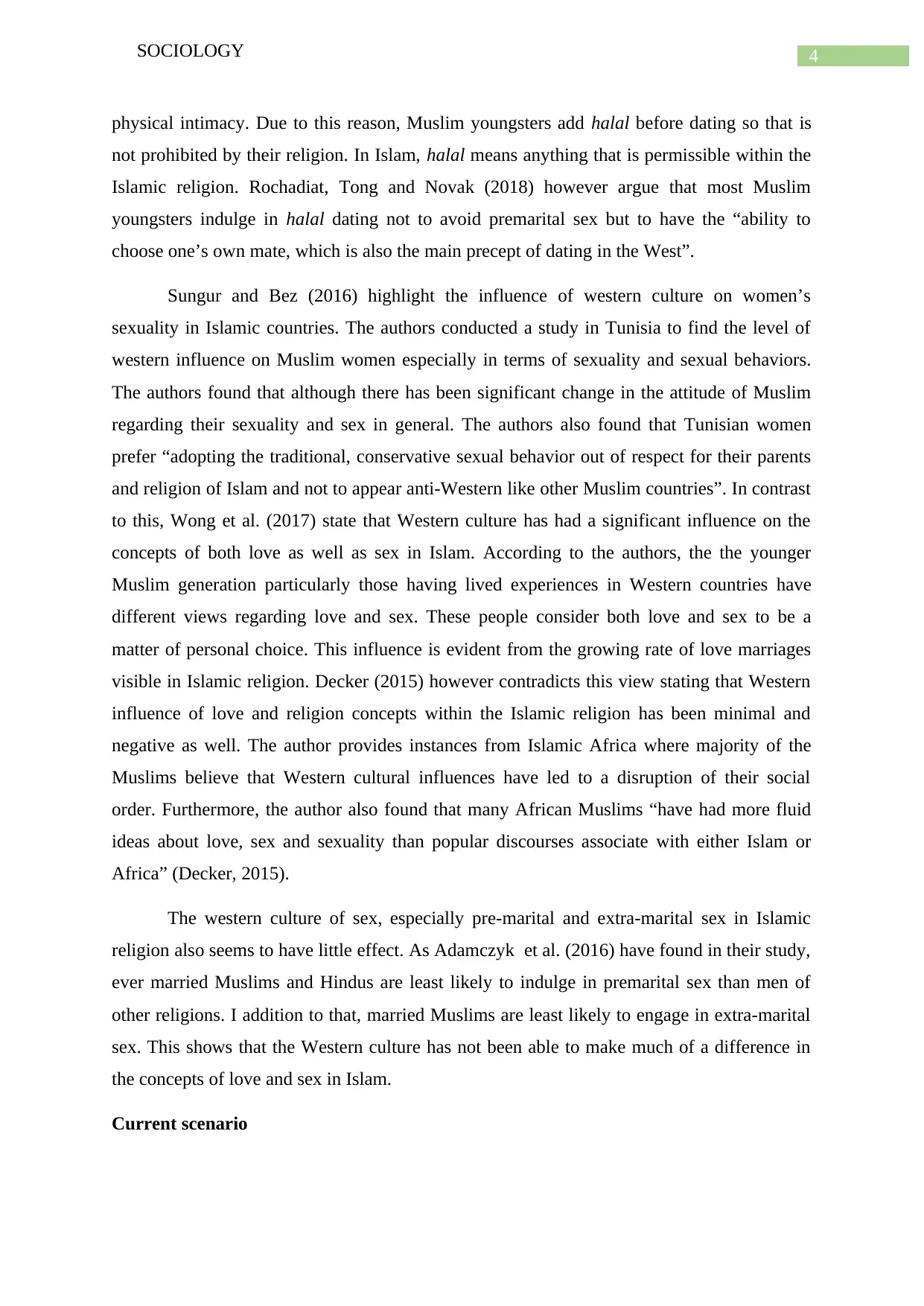
4SOCIOLOGY
physical intimacy. Due to this reason, Muslim youngsters add halal before dating so that is
not prohibited by their religion. In Islam, halal means anything that is permissible within the
Islamic religion. Rochadiat, Tong and Novak (2018) however argue that most Muslim
youngsters indulge in halal dating not to avoid premarital sex but to have the “ability to
choose one’s own mate, which is also the main precept of dating in the West”.
Sungur and Bez (2016) highlight the influence of western culture on women’s
sexuality in Islamic countries. The authors conducted a study in Tunisia to find the level of
western influence on Muslim women especially in terms of sexuality and sexual behaviors.
The authors found that although there has been significant change in the attitude of Muslim
regarding their sexuality and sex in general. The authors also found that Tunisian women
prefer “adopting the traditional, conservative sexual behavior out of respect for their parents
and religion of Islam and not to appear anti-Western like other Muslim countries”. In contrast
to this, Wong et al. (2017) state that Western culture has had a significant influence on the
concepts of both love as well as sex in Islam. According to the authors, the the younger
Muslim generation particularly those having lived experiences in Western countries have
different views regarding love and sex. These people consider both love and sex to be a
matter of personal choice. This influence is evident from the growing rate of love marriages
visible in Islamic religion. Decker (2015) however contradicts this view stating that Western
influence of love and religion concepts within the Islamic religion has been minimal and
negative as well. The author provides instances from Islamic Africa where majority of the
Muslims believe that Western cultural influences have led to a disruption of their social
order. Furthermore, the author also found that many African Muslims “have had more fluid
ideas about love, sex and sexuality than popular discourses associate with either Islam or
Africa” (Decker, 2015).
The western culture of sex, especially pre-marital and extra-marital sex in Islamic
religion also seems to have little effect. As Adamczyk et al. (2016) have found in their study,
ever married Muslims and Hindus are least likely to indulge in premarital sex than men of
other religions. I addition to that, married Muslims are least likely to engage in extra-marital
sex. This shows that the Western culture has not been able to make much of a difference in
the concepts of love and sex in Islam.
Current scenario
physical intimacy. Due to this reason, Muslim youngsters add halal before dating so that is
not prohibited by their religion. In Islam, halal means anything that is permissible within the
Islamic religion. Rochadiat, Tong and Novak (2018) however argue that most Muslim
youngsters indulge in halal dating not to avoid premarital sex but to have the “ability to
choose one’s own mate, which is also the main precept of dating in the West”.
Sungur and Bez (2016) highlight the influence of western culture on women’s
sexuality in Islamic countries. The authors conducted a study in Tunisia to find the level of
western influence on Muslim women especially in terms of sexuality and sexual behaviors.
The authors found that although there has been significant change in the attitude of Muslim
regarding their sexuality and sex in general. The authors also found that Tunisian women
prefer “adopting the traditional, conservative sexual behavior out of respect for their parents
and religion of Islam and not to appear anti-Western like other Muslim countries”. In contrast
to this, Wong et al. (2017) state that Western culture has had a significant influence on the
concepts of both love as well as sex in Islam. According to the authors, the the younger
Muslim generation particularly those having lived experiences in Western countries have
different views regarding love and sex. These people consider both love and sex to be a
matter of personal choice. This influence is evident from the growing rate of love marriages
visible in Islamic religion. Decker (2015) however contradicts this view stating that Western
influence of love and religion concepts within the Islamic religion has been minimal and
negative as well. The author provides instances from Islamic Africa where majority of the
Muslims believe that Western cultural influences have led to a disruption of their social
order. Furthermore, the author also found that many African Muslims “have had more fluid
ideas about love, sex and sexuality than popular discourses associate with either Islam or
Africa” (Decker, 2015).
The western culture of sex, especially pre-marital and extra-marital sex in Islamic
religion also seems to have little effect. As Adamczyk et al. (2016) have found in their study,
ever married Muslims and Hindus are least likely to indulge in premarital sex than men of
other religions. I addition to that, married Muslims are least likely to engage in extra-marital
sex. This shows that the Western culture has not been able to make much of a difference in
the concepts of love and sex in Islam.
Current scenario
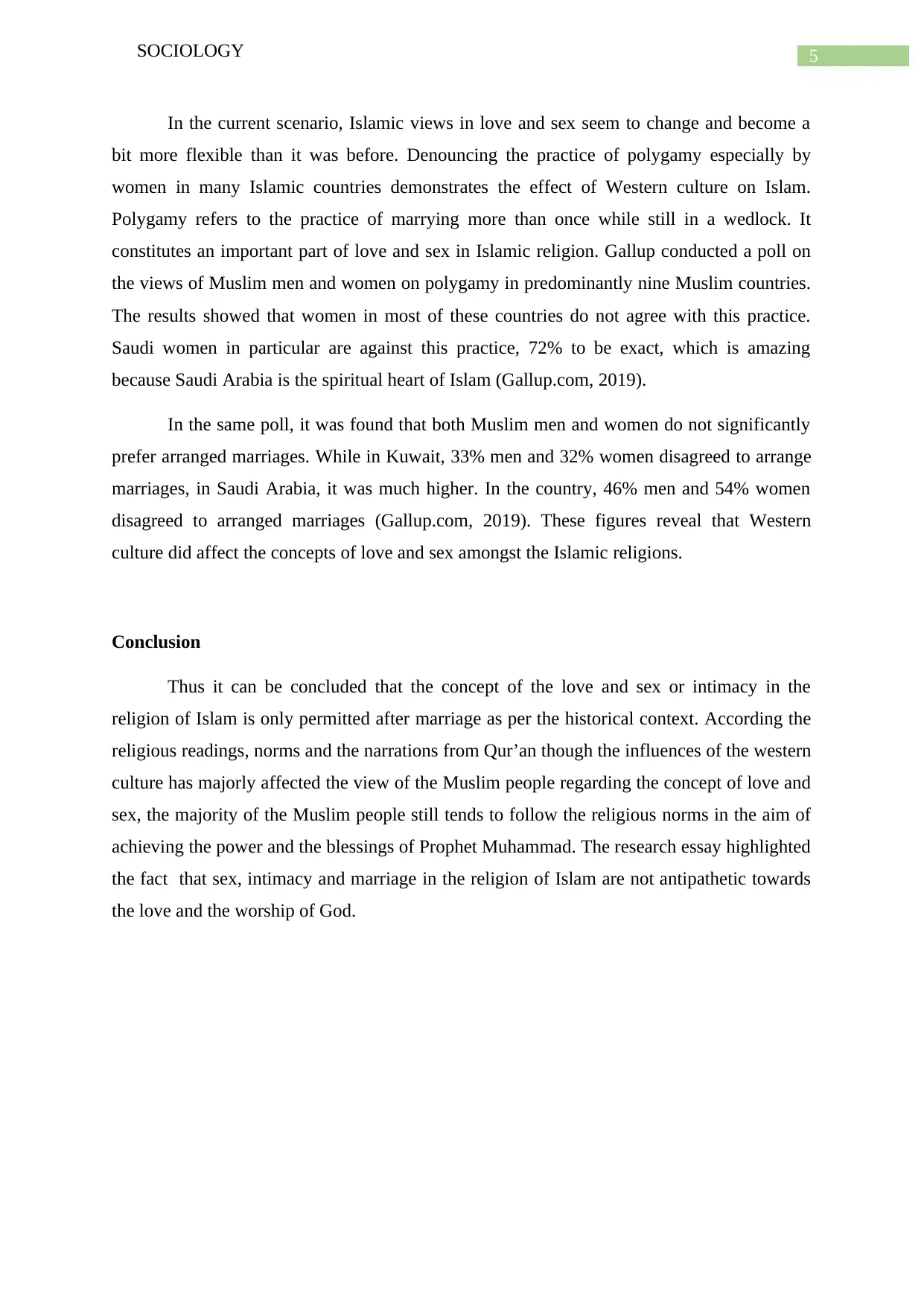
5SOCIOLOGY
In the current scenario, Islamic views in love and sex seem to change and become a
bit more flexible than it was before. Denouncing the practice of polygamy especially by
women in many Islamic countries demonstrates the effect of Western culture on Islam.
Polygamy refers to the practice of marrying more than once while still in a wedlock. It
constitutes an important part of love and sex in Islamic religion. Gallup conducted a poll on
the views of Muslim men and women on polygamy in predominantly nine Muslim countries.
The results showed that women in most of these countries do not agree with this practice.
Saudi women in particular are against this practice, 72% to be exact, which is amazing
because Saudi Arabia is the spiritual heart of Islam (Gallup.com, 2019).
In the same poll, it was found that both Muslim men and women do not significantly
prefer arranged marriages. While in Kuwait, 33% men and 32% women disagreed to arrange
marriages, in Saudi Arabia, it was much higher. In the country, 46% men and 54% women
disagreed to arranged marriages (Gallup.com, 2019). These figures reveal that Western
culture did affect the concepts of love and sex amongst the Islamic religions.
Conclusion
Thus it can be concluded that the concept of the love and sex or intimacy in the
religion of Islam is only permitted after marriage as per the historical context. According the
religious readings, norms and the narrations from Qur’an though the influences of the western
culture has majorly affected the view of the Muslim people regarding the concept of love and
sex, the majority of the Muslim people still tends to follow the religious norms in the aim of
achieving the power and the blessings of Prophet Muhammad. The research essay highlighted
the fact that sex, intimacy and marriage in the religion of Islam are not antipathetic towards
the love and the worship of God.
In the current scenario, Islamic views in love and sex seem to change and become a
bit more flexible than it was before. Denouncing the practice of polygamy especially by
women in many Islamic countries demonstrates the effect of Western culture on Islam.
Polygamy refers to the practice of marrying more than once while still in a wedlock. It
constitutes an important part of love and sex in Islamic religion. Gallup conducted a poll on
the views of Muslim men and women on polygamy in predominantly nine Muslim countries.
The results showed that women in most of these countries do not agree with this practice.
Saudi women in particular are against this practice, 72% to be exact, which is amazing
because Saudi Arabia is the spiritual heart of Islam (Gallup.com, 2019).
In the same poll, it was found that both Muslim men and women do not significantly
prefer arranged marriages. While in Kuwait, 33% men and 32% women disagreed to arrange
marriages, in Saudi Arabia, it was much higher. In the country, 46% men and 54% women
disagreed to arranged marriages (Gallup.com, 2019). These figures reveal that Western
culture did affect the concepts of love and sex amongst the Islamic religions.
Conclusion
Thus it can be concluded that the concept of the love and sex or intimacy in the
religion of Islam is only permitted after marriage as per the historical context. According the
religious readings, norms and the narrations from Qur’an though the influences of the western
culture has majorly affected the view of the Muslim people regarding the concept of love and
sex, the majority of the Muslim people still tends to follow the religious norms in the aim of
achieving the power and the blessings of Prophet Muhammad. The research essay highlighted
the fact that sex, intimacy and marriage in the religion of Islam are not antipathetic towards
the love and the worship of God.
⊘ This is a preview!⊘
Do you want full access?
Subscribe today to unlock all pages.

Trusted by 1+ million students worldwide
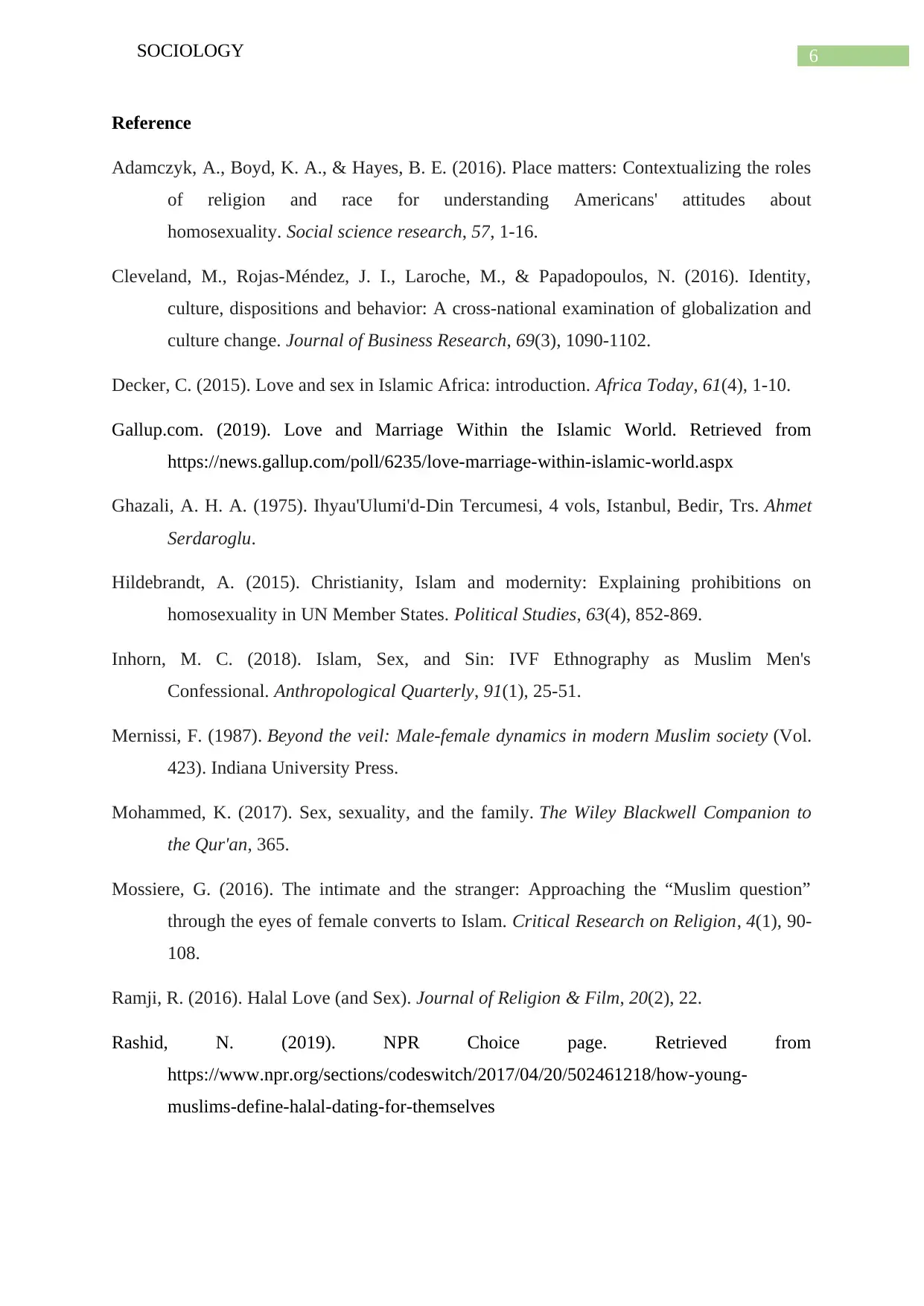
6SOCIOLOGY
Reference
Adamczyk, A., Boyd, K. A., & Hayes, B. E. (2016). Place matters: Contextualizing the roles
of religion and race for understanding Americans' attitudes about
homosexuality. Social science research, 57, 1-16.
Cleveland, M., Rojas-Méndez, J. I., Laroche, M., & Papadopoulos, N. (2016). Identity,
culture, dispositions and behavior: A cross-national examination of globalization and
culture change. Journal of Business Research, 69(3), 1090-1102.
Decker, C. (2015). Love and sex in Islamic Africa: introduction. Africa Today, 61(4), 1-10.
Gallup.com. (2019). Love and Marriage Within the Islamic World. Retrieved from
https://news.gallup.com/poll/6235/love-marriage-within-islamic-world.aspx
Ghazali, A. H. A. (1975). Ihyau'Ulumi'd-Din Tercumesi, 4 vols, Istanbul, Bedir, Trs. Ahmet
Serdaroglu.
Hildebrandt, A. (2015). Christianity, Islam and modernity: Explaining prohibitions on
homosexuality in UN Member States. Political Studies, 63(4), 852-869.
Inhorn, M. C. (2018). Islam, Sex, and Sin: IVF Ethnography as Muslim Men's
Confessional. Anthropological Quarterly, 91(1), 25-51.
Mernissi, F. (1987). Beyond the veil: Male-female dynamics in modern Muslim society (Vol.
423). Indiana University Press.
Mohammed, K. (2017). Sex, sexuality, and the family. The Wiley Blackwell Companion to
the Qur'an, 365.
Mossiere, G. (2016). The intimate and the stranger: Approaching the “Muslim question”
through the eyes of female converts to Islam. Critical Research on Religion, 4(1), 90-
108.
Ramji, R. (2016). Halal Love (and Sex). Journal of Religion & Film, 20(2), 22.
Rashid, N. (2019). NPR Choice page. Retrieved from
https://www.npr.org/sections/codeswitch/2017/04/20/502461218/how-young-
muslims-define-halal-dating-for-themselves
Reference
Adamczyk, A., Boyd, K. A., & Hayes, B. E. (2016). Place matters: Contextualizing the roles
of religion and race for understanding Americans' attitudes about
homosexuality. Social science research, 57, 1-16.
Cleveland, M., Rojas-Méndez, J. I., Laroche, M., & Papadopoulos, N. (2016). Identity,
culture, dispositions and behavior: A cross-national examination of globalization and
culture change. Journal of Business Research, 69(3), 1090-1102.
Decker, C. (2015). Love and sex in Islamic Africa: introduction. Africa Today, 61(4), 1-10.
Gallup.com. (2019). Love and Marriage Within the Islamic World. Retrieved from
https://news.gallup.com/poll/6235/love-marriage-within-islamic-world.aspx
Ghazali, A. H. A. (1975). Ihyau'Ulumi'd-Din Tercumesi, 4 vols, Istanbul, Bedir, Trs. Ahmet
Serdaroglu.
Hildebrandt, A. (2015). Christianity, Islam and modernity: Explaining prohibitions on
homosexuality in UN Member States. Political Studies, 63(4), 852-869.
Inhorn, M. C. (2018). Islam, Sex, and Sin: IVF Ethnography as Muslim Men's
Confessional. Anthropological Quarterly, 91(1), 25-51.
Mernissi, F. (1987). Beyond the veil: Male-female dynamics in modern Muslim society (Vol.
423). Indiana University Press.
Mohammed, K. (2017). Sex, sexuality, and the family. The Wiley Blackwell Companion to
the Qur'an, 365.
Mossiere, G. (2016). The intimate and the stranger: Approaching the “Muslim question”
through the eyes of female converts to Islam. Critical Research on Religion, 4(1), 90-
108.
Ramji, R. (2016). Halal Love (and Sex). Journal of Religion & Film, 20(2), 22.
Rashid, N. (2019). NPR Choice page. Retrieved from
https://www.npr.org/sections/codeswitch/2017/04/20/502461218/how-young-
muslims-define-halal-dating-for-themselves
Paraphrase This Document
Need a fresh take? Get an instant paraphrase of this document with our AI Paraphraser
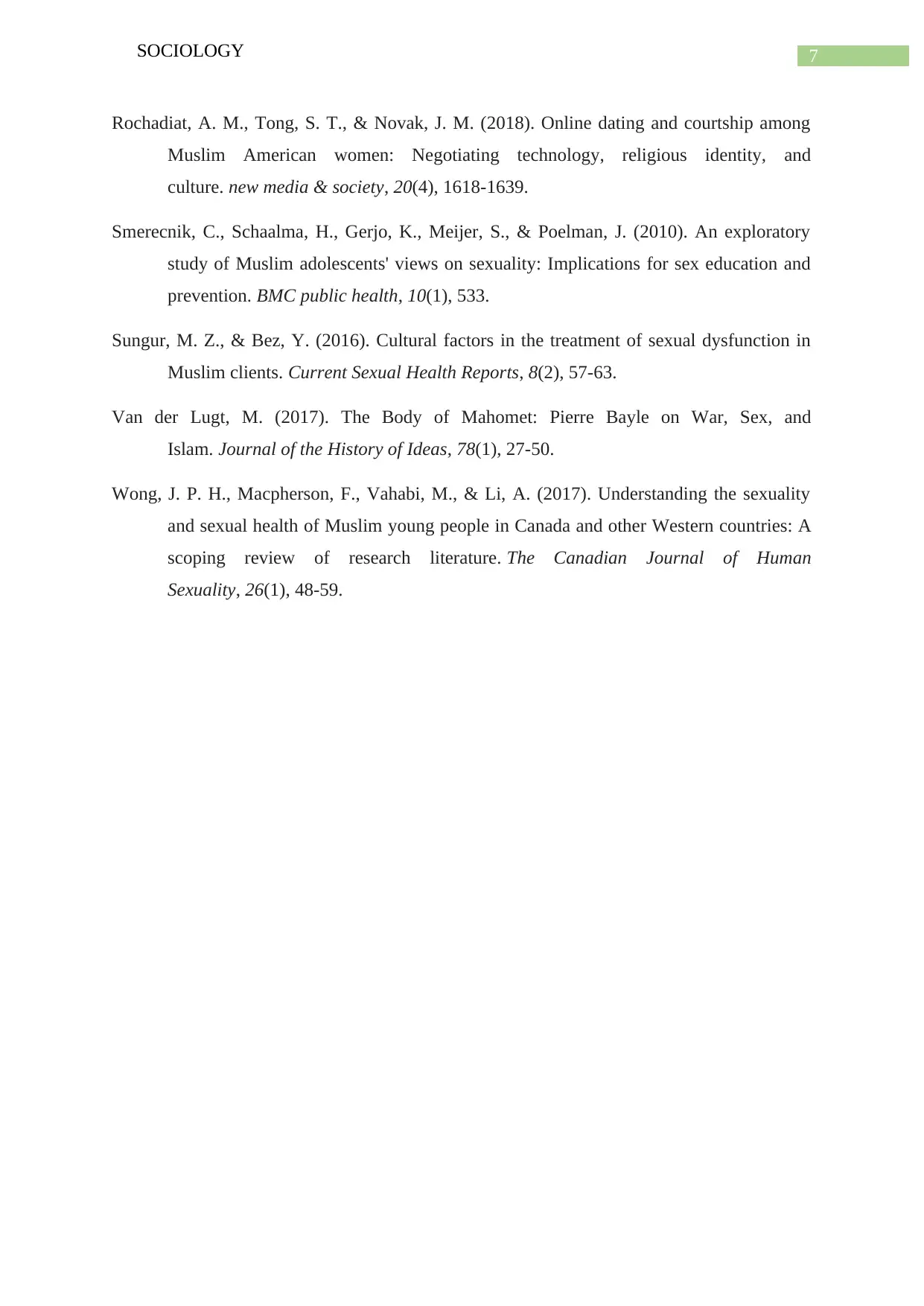
7SOCIOLOGY
Rochadiat, A. M., Tong, S. T., & Novak, J. M. (2018). Online dating and courtship among
Muslim American women: Negotiating technology, religious identity, and
culture. new media & society, 20(4), 1618-1639.
Smerecnik, C., Schaalma, H., Gerjo, K., Meijer, S., & Poelman, J. (2010). An exploratory
study of Muslim adolescents' views on sexuality: Implications for sex education and
prevention. BMC public health, 10(1), 533.
Sungur, M. Z., & Bez, Y. (2016). Cultural factors in the treatment of sexual dysfunction in
Muslim clients. Current Sexual Health Reports, 8(2), 57-63.
Van der Lugt, M. (2017). The Body of Mahomet: Pierre Bayle on War, Sex, and
Islam. Journal of the History of Ideas, 78(1), 27-50.
Wong, J. P. H., Macpherson, F., Vahabi, M., & Li, A. (2017). Understanding the sexuality
and sexual health of Muslim young people in Canada and other Western countries: A
scoping review of research literature. The Canadian Journal of Human
Sexuality, 26(1), 48-59.
Rochadiat, A. M., Tong, S. T., & Novak, J. M. (2018). Online dating and courtship among
Muslim American women: Negotiating technology, religious identity, and
culture. new media & society, 20(4), 1618-1639.
Smerecnik, C., Schaalma, H., Gerjo, K., Meijer, S., & Poelman, J. (2010). An exploratory
study of Muslim adolescents' views on sexuality: Implications for sex education and
prevention. BMC public health, 10(1), 533.
Sungur, M. Z., & Bez, Y. (2016). Cultural factors in the treatment of sexual dysfunction in
Muslim clients. Current Sexual Health Reports, 8(2), 57-63.
Van der Lugt, M. (2017). The Body of Mahomet: Pierre Bayle on War, Sex, and
Islam. Journal of the History of Ideas, 78(1), 27-50.
Wong, J. P. H., Macpherson, F., Vahabi, M., & Li, A. (2017). Understanding the sexuality
and sexual health of Muslim young people in Canada and other Western countries: A
scoping review of research literature. The Canadian Journal of Human
Sexuality, 26(1), 48-59.
1 out of 8
Your All-in-One AI-Powered Toolkit for Academic Success.
+13062052269
info@desklib.com
Available 24*7 on WhatsApp / Email
![[object Object]](/_next/static/media/star-bottom.7253800d.svg)
Unlock your academic potential
Copyright © 2020–2025 A2Z Services. All Rights Reserved. Developed and managed by ZUCOL.